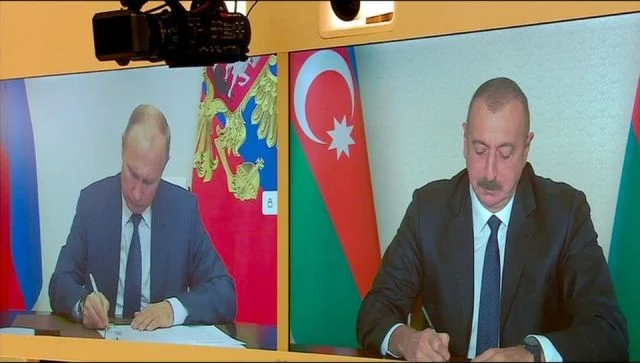The lead researcher at the Moscow State Institute of International Relations (MGIMO) and editor-in-chief of the International Analysis magazine, Sergey Markedonov, is convinced that if it were not for Russia, Azerbaijan would have caused a storm in Stepanakert, and Turkey would have invaded Armenia from Gyumri.
In response to the observation made during the online discussion within the framework of the “Let’s Talk About the Future” series co-sponsored by Futures Studio journalist and author Mark Grigoryan on how Russia started a bad game in the Caucasus that we are now feeling the effects of and the question of if Russia is capable of having serious influence in the Caucasus without a real Armenia, Sergey Markedonov said, “I don’t know your standards for a good or bad game. Every state has its interests. Politics is an art of opportunity, and every state wishes to build its policies based on that. If that were not the case, perhaps we would have seen a storm in Stepanakert, but Azerbaijan did not do that. Or, Turkey would have invaded from Gyumri, which also did not happen. We can understand why that did not happen.”
Regarding the Russian side’s position on the Artsakh issue, the researcher said, “The Russian position on Artsakh is not a secret for anyone. It is not necessary to expect surprises. For Armenia, Artsakh and the regions are a security system, a matter of Armenian identity. After the victory in the first Artsakh War, the Armenian identity was built on Greater Armenia. Not only Armenia, but Artsakh with its regions. It was perceived differently in Russia, however. Armenia was perceived as separate from Artsakh, and Artsakh was an issue of conflict. The regions were not considered to be something that Moscow should protect. Based on this, we should look at Russia’s position, but not from the point of view we would like. Did the issue of the five regions rise in the 20th century? Of course not. Remember the Kazan Resolution in 2011, the updated Madrid Principles in 2019, etc.”
Mark Grigoryan noted that the three presidents of Armenia held negotiations with Azerbaijan where they raised the question of what the five regions would be handed over in exchange for. The question was not whether or not the five regions would be handed over. But Armenian society did not notice that. Regarding this, Sergey Markedonov said, “The issue of negotiations and concessions became a tool in domestic political issues. Kocharyan’s and Sargsyan’s supporters would say that Levon Ter-Petrossian argued that those regions needed to be handed over, and Ter-Petrossian’s supporters would blame Kocharyan and Sargsyan. In any case, the negotiations were used as a means to weaken one another.”
Read also
Sergey Markedonov also connected Russia’s position on Artsakh with Turkey. He explained, “I understand that Azerbaijan is connected to Turkey in terms of its obligations. Let’s not forget the large Turkish population in Russia. That is why Russia has its obligations and rules of the game, which can also explain its position. It is important to consider that Turkey has not touched the Republic of Armenia’s territory in the 1990s or in 2020. What took place in the 17th and 18th centuries did not happen. That might have happened without Russia. The same goes for 2020. Of course, the agreement made in November was very heavy. It seems like a cold shower, but there were worse options. There was also a better option if they accepted Vladimir Putin’s offer in October. In any case, both Armenia and Azerbaijan are important for Russia, just as Georgia was also important, if, of course, Georgia did not take action and turn itself into a Russia-NATO battlefield with its own hands.”
Tatev Harutyunyan

























































